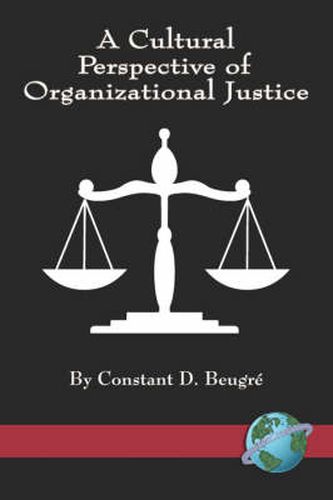Readings Newsletter
Become a Readings Member to make your shopping experience even easier.
Sign in or sign up for free!
You’re not far away from qualifying for FREE standard shipping within Australia
You’ve qualified for FREE standard shipping within Australia
The cart is loading…






This title is printed to order. This book may have been self-published. If so, we cannot guarantee the quality of the content. In the main most books will have gone through the editing process however some may not. We therefore suggest that you be aware of this before ordering this book. If in doubt check either the author or publisher’s details as we are unable to accept any returns unless they are faulty. Please contact us if you have any questions.
This book analyzes the impact of culture on employee justice judgments and reactions to perceptions of fairness and unfairness. I start this book with the following two questions. Why is a book on culture and organizational justice needed? What does such a book add to the extant literature on organizational justice, especially, after the publication of the landmark work of Colquitt and Greenberg (2005), Handbook of Organizational Justice? Although there are no easy answers to these questions, in the following lines, I explain the reasons why a book on culture and justice is not only needed but also timely. There are at least three reasons for which a book on culture and organizational justice is needed. First, a book on culture and organizational justice is needed because
there are indications that culture exerts very important and wide-ranging effects on justice behavior including even generally shaping the likelihood that individuals will experience feelings of injustice
(James, 1993, p. 22). Second, globalization has led to the interrelatedness of world economies.Thus, most organizations not only operate in several countries, but they also employ people from different nationalities and cultural backgrounds. The resulting challenge is to find new ways of managing a culturally diverse workforce. Third, justice is inherent to any organized social group. As examples of social systems, organizations are arenas of justice concerns because their members compete for limited resources. The resources for which they compete include tangibles, such as money but also intangibles, such as status, power, and prestige (e.g., Tajfel & Turner, 1979; Turner, 1985). In the following lines, I elaborate on the three reasons why a book on culture and organizational justice is needed and timely.
$9.00 standard shipping within Australia
FREE standard shipping within Australia for orders over $100.00
Express & International shipping calculated at checkout
This title is printed to order. This book may have been self-published. If so, we cannot guarantee the quality of the content. In the main most books will have gone through the editing process however some may not. We therefore suggest that you be aware of this before ordering this book. If in doubt check either the author or publisher’s details as we are unable to accept any returns unless they are faulty. Please contact us if you have any questions.
This book analyzes the impact of culture on employee justice judgments and reactions to perceptions of fairness and unfairness. I start this book with the following two questions. Why is a book on culture and organizational justice needed? What does such a book add to the extant literature on organizational justice, especially, after the publication of the landmark work of Colquitt and Greenberg (2005), Handbook of Organizational Justice? Although there are no easy answers to these questions, in the following lines, I explain the reasons why a book on culture and justice is not only needed but also timely. There are at least three reasons for which a book on culture and organizational justice is needed. First, a book on culture and organizational justice is needed because
there are indications that culture exerts very important and wide-ranging effects on justice behavior including even generally shaping the likelihood that individuals will experience feelings of injustice
(James, 1993, p. 22). Second, globalization has led to the interrelatedness of world economies.Thus, most organizations not only operate in several countries, but they also employ people from different nationalities and cultural backgrounds. The resulting challenge is to find new ways of managing a culturally diverse workforce. Third, justice is inherent to any organized social group. As examples of social systems, organizations are arenas of justice concerns because their members compete for limited resources. The resources for which they compete include tangibles, such as money but also intangibles, such as status, power, and prestige (e.g., Tajfel & Turner, 1979; Turner, 1985). In the following lines, I elaborate on the three reasons why a book on culture and organizational justice is needed and timely.